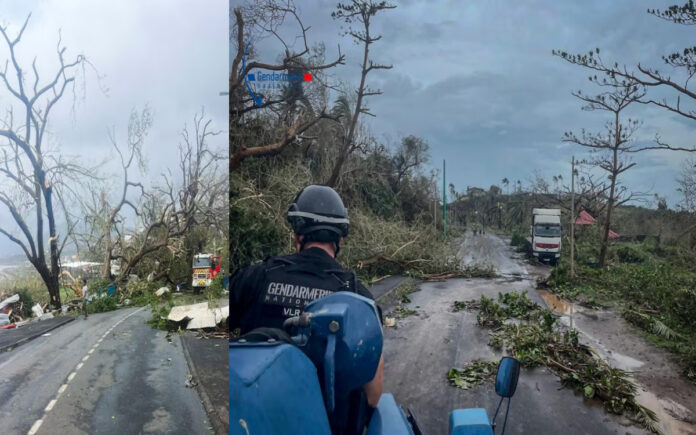Paris: Emergency workers in Mayotte, France’s poorest overseas territory, are engaged in a desperate search for survivors following Cyclone Chido, the worst storm to hit the Indian Ocean islands in nearly a century. Hundreds, possibly thousands, are feared dead as the full scale of the disaster unfolds.
Cyclone Chido struck over the weekend with devastating winds exceeding 200 kph (124 mph), flattening homes, cutting off communication, and disrupting power, drinking water, and other essential services. Large parts of the archipelago remain inaccessible, complicating rescue efforts. Acting Interior Minister Bruno Retailleau, who visited the disaster zone, said it would take days to assess the extent of damage and fatalities.
Scenes of Despair and Survival
In the aftermath of the cyclone, residents queued outside grocery stores in search of water and basic necessities. “It really is a war landscape. I don’t recognize anything anymore. There’s not even a tree left, not a blade of grass,” said Mayotte resident Camille Cozon Abdourazak in a video call after power was restored to her home. She recounted finding water and tins of milk to share with her neighbor’s baby.
Teacher Hamada Ali described streets covered in mud and debris, with many residents sheltering in schools. “Houses with sheet metal roofs were swept away by the cyclone,” he said.
Communication breakdowns across much of the territory left families frantic for updates. One social media user pleaded, “I need an update from Chiconi, please. My brother, sister-in-law, and niece are there, and I’ve had no news since Saturday.”
Emergency Response and Support
French President Emmanuel Macron convened an emergency meeting on Monday to address the crisis. Meanwhile, France’s lower house of parliament observed a minute’s silence. Acting Health Minister Geneviève Darrieussecq confirmed that Mamoudzou’s main hospital remained operational despite flood damage to critical units. Plans are underway to establish a field clinic and deploy 100 additional medics to the region.
Maritime and aerial operations are delivering relief supplies and equipment, including from nearby Reunion Island, another French overseas territory. However, Mayotte’s main airport remained closed to civilian flights on Monday, according to Jean-Paul Bosland, president of France’s national firefighters’ federation.
A Vulnerable Territory
With over three-quarters of Mayotte’s 321,000 residents living in relative poverty, the cyclone’s impact has been catastrophic. According to 2021 figures from the INSEE statistics agency, the territory’s median disposable income is just over €3,000 ($3,150) annually—roughly eight times less than the Ile-de-France region around Paris.
Cyclone Chido is the strongest storm to hit Mayotte in over 90 years, according to French weather service Météo France. Extreme weather events, exacerbated by global warming, have become increasingly frequent worldwide. “The destruction in Mayotte lays bare our failure to prepare for climate change,” said left-wing lawmaker Eric Coquerel during an interview with French broadcaster LCI.
Also Read | Canada Finance Minister Resigns After Clash With Trudeau, Delivering a Major Blow to Government
Trail of Devastation
Images from local media and the French gendarmerie reveal the cyclone’s devastation: makeshift houses smashed to pieces, coconut trees piercing rooftops, and rubble covering vehicles. “I was screaming because I could see the end coming for me,” said John Balloz, a resident of Mamoudzou.
After striking Mayotte, Cyclone Chido weakened into a tropical storm as it made landfall in northern Mozambique, where it still managed to destroy several homes, authorities reported.
Uncertain Death Toll
Mayotte Prefect François-Xavier Bieuville estimated over the weekend that the death toll could range from hundreds to several thousand. As rescue teams comb through debris and provide relief, the island’s recovery will likely take years.



